Wheels of Time

Arizona’s Automotive Museums
Writer Joseph J. Airdo
The story of Arizona’s automotive heritage runs deeper than its legendary highways and desert proving grounds. Tucked into communities across the state, 10 remarkable museums preserve not just vehicles but the dreams, innovations and personal stories that drove them forward.
These institutions range from intimate family collections to world-class facilities. Along Route 66, visitors explore both the Mother Road’s evolution and the world’s first museum dedicated to electric vehicles. In Phoenix, championship racing machines maintain their racing-ready condition, while in Tucson, generations of family history intertwine with automotive preservation.
Each museum offers its own distinctive journey through time. Some celebrate the artistic vision of custom designers; others document the evolution of American manufacturing; and a few maintain their collections in running condition — keeping history alive through the rumble of engines and the timeless appeal of chrome and steel.
Arizona Route 66 Museum
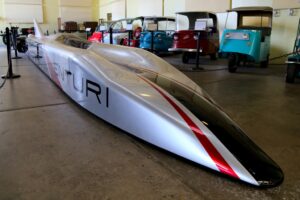


Arizona’s automotive heritage begins where America’s most famous highway carved its path through the state. The Arizona Route 66 Museum, housed in Kingman’s Historic Powerhouse, offers visitors a unique two-for-one experience: a journey through the Mother Road’s evolution and the world’s first museum dedicated solely to electric vehicles.
“The Arizona Route 66 Museum is the only Route 66 museum that tells the chronological story of Route 66,” explains Josh Noble of the Kingman Office of Tourism. “From Native American trade routes to wagon roads, from railroad to automobile, visitors experience the complete evolution of this iconic pathway.”
The museum’s exhibits are undergoing a complete overhaul, scheduled for completion in mid-2025 to coincide with Route 66’s centennial celebration. Meanwhile, the attached Route 66 Electric Vehicle Museum continues to draw technology enthusiasts with its extensive collection spanning more than 100 years of EV history.
“There are other car museums that have an EV or two on display,” Noble notes, “but as of yet no others that even have a complete display dedicated to EVs.”
Recent additions include a 2008 Tesla Roadster II, identical to the one famously launched into space by SpaceX. Looking ahead to 2025, the museum is expanding its hours to accommodate growing interest. Currently open daily from 9 a.m. to 4 p.m., the facility will transition to 8 a.m. to 5 p.m. operations in early 2025.
Arizona Route 66 Museum
120 W. Andy Devine Ave., Kingman // Adults: $10, seniors: $6, children under 12: free with paying adult // 928-753-9889 // mohavemuseum.org
Art Car World
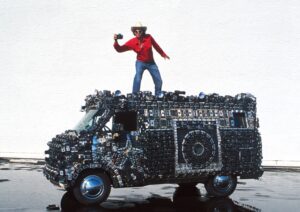


In the border town of Douglas, a museum challenges conventional definitions of automotive artistry. Art Car World houses 37 vehicles that blur the line between transportation and transformation, each one a testament to creative vision unleashed on four wheels.
“Creating an art car for our museum typically takes around three years,” reveals owner Harrod Blank, “though some have been in progress for up to 28 years.”
This patient dedication to artistic expression has resulted in a collection that stops visitors in their tracks. Signature pieces include “The Carthedral” by Rebecca Caldwell and Blank’s own “Camera Van,” alongside artistic elements like neon signs by John Law, signature pieces by Allen Christian, and a world globe by Royce Carlson.
“When visitors walk through our doors, they’re often left speechless,” Blank says. “They’re simply in awe of what they’re seeing. The reactions tell me that what we’ve created here is truly beyond what most people could imagine.”
The museum’s mission to showcase the diversity of ideas and artistic expression in automotive art comes alive through custom tours, which typically last 45 minutes and offer intimate glimpses into this unique art form.
Art Car World
401 E. Ninth St., Douglas // Friday-Sunday: 11 a.m.–7 p.m. // Suggested donation: $5–$10 // artcarworld.org
Buddy Stubbs Motorcycle Museum
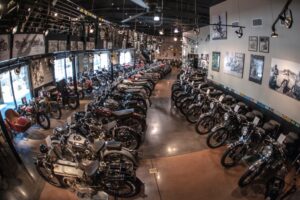


Phoenix’s premier motorcycle museum began with a Hollywood stuntman’s passion. After a successful career as both a racing legend and stunt performer, Buddy Stubbs opened his Harley-Davidson dealership in 1966, creating a home for what would become one of the Southwest’s largest collections of rare motorcycles.
“The museum’s collection is the largest in the Southwest, showcasing the development of touring bikes in Europe during the period when Harley-Davidson ruled America,” says Adrien Burkhart, director of marketing and events. “From the earliest examples of street bikes to racing machines, our collection tells the complete story of motorcycle evolution.”
The 3,000-square-foot facility houses more than 130 machines from 37 manufacturers, spanning more than 110 years of motorcycle history. Highlights include an original 1903 Harley-Davidson model and rare specimens from Norton, Vincent HRD, Brough Superior and other legendary makers.
The museum’s docents share fascinating details about each bike, from early street models to racing machines from the 1930s, ‘40s and ‘50s. A particularly impressive display features vintage Triumphs, showcasing the parallel development of European touring bikes during America’s Harley-Davidson era.
Buddy Stubbs Motorcycle Museum
13850 N. Cave Creek Road, Phoenix // Saturdays: 11 a.m.–5 p.m. (tours available by request daily) // Free admission // buddystubbshd.com/museum
Dwarf Car Museum
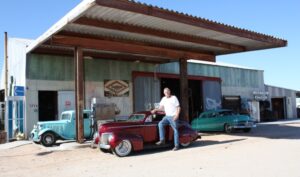


In Maricopa, Ernie Adams has spent decades crafting something unique in the automotive world: perfectly scaled-down replicas of classic cars, each one handmade from scratch. His fascination began in childhood, when a simple tire swing against an old refrigerator sparked an enduring passion.
“When I was 15, I was sitting at our kitchen table,” Adams recalls. “Through the window, I saw a tire swing lying against the body of an old refrigerator. It looked like a touring car with a black fender. I knew from that moment I wanted to build a car like that.”
His first creation, known as “Grandpa Dwarf,” came to life in 1965 — a 1928 Chevy two-door sedan constructed from nine old refrigerators. Today, the museum showcases 19 dwarf cars inside (eight fully street legal) and 18 cars and tractors outside, including recent additions like his completed 1941 Chevy two-door sedan.
“Visitors are most surprised to learn that my Dwarf Cruisers are real, functioning cars that you can actually get inside and drive down the highway at full speed,” Adams says. “I would say my Dwarf 1934 Ford two-door sedan is my favorite car in my collection. It has one of the most beautiful bodies of any car.”
Throughout the day, Adams selects visitors to sit in a dwarf car and demonstrates the vehicles running, bringing his miniature masterpieces to life.
Dwarf Car Museum
52954 W. Halfmoon Road, Maricopa // Daily: 9 a.m.–4 p.m. // Adults: $5, children under 10: free // dwarfcarmuseum.com
Franklin Auto Museum
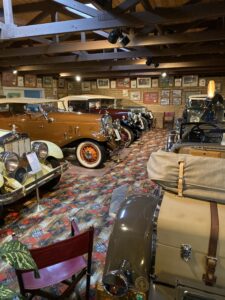


Tucked away in a historic adobe home in Tucson, the Franklin Auto Museum preserves a unique chapter of automotive innovation. The museum showcases a meticulously curated collection of 25 to 27 classic Franklin automobiles, providing a comprehensive look at the company’s distinctive air-cooled production history.
“We offer a full spectrum of exhibits about the Franklin automobile plus other cars of local history,” says museum director Bourke Runton. “The collection has many custom-body classic Franklins restored to world-class quality.”
Among the museum’s treasures are two remarkable time capsules. “We have the two lowest-mileage original cars remaining,” Runton notes, “a 1910 and a 1924 just as they left the factory.”
Recent additions to the collection include a 1915 Saxon roadster. The facility has undergone infrastructure improvements, including plumbing restoration. Guided tours, available on a walk-in basis when possible, offer what Runton describes as “multilevel interpretation of automotive history to meet the interest level of the visitors.”
Franklin Auto Museum
1405 E. Kleindale Road, Tucson // Wednesday–Saturday: 10 a.m.–4 p.m. (through May 2) // Adults: $12, seniors (62+): $10 // franklinmuseum.org
JWJ Cycles Museum
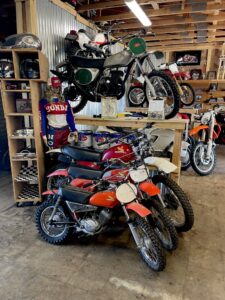


In San Manuel, a unique motorcycle museum tells the story of a family’s lifelong passion for two-wheeled adventure. JWJ Cycles — named for founder Jack Traweek, his brother Warren, and Jill, the late wife of Jack’s son, Parrish — houses approximately 100 motorcycles, each with its own tale to tell.
“We honor the legacy of brothers Jack and Warren through a collection of around 100 motorcycles, including their early bikes, riding gear and photographs,” explains Parrish Traweek, who maintains the collection. “Unique pieces like our Pulse Autocycle and Russian Minsk make our collection especially distinctive.”
The museum serves as more than just a display space.
“We’re more than a museum — we’re a hub for riders,” Traweek says. “Visitors can stage rides from our facility, stay overnight, and participate in our regular events. We preserve motorcycle history while creating new riding opportunities.”
This combination of historical preservation and active riding culture makes JWJ Cycles unique among automotive museums. Visitors can explore the collection, then take advantage of unlimited local desert trails and nearby dining options.
JWJ Cycles Museum
San Manuel // Open by appointment // Free admission // 520-664-4812 // jwjcycles.com
Martin Auto Museum
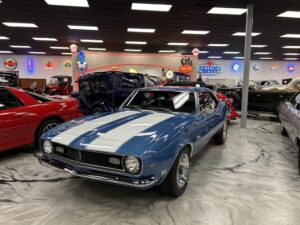


What began in 2005 as one man’s vision to share automotive history has evolved into one of Arizona’s largest car collections. The Martin Auto Museum and Event Center, which relocated to a 107,000-square-foot facility in Phoenix in March 2022, houses more than 200 vehicles that chronicle the evolution of automotive excellence.
“The Martin Auto Museum is home to one of the most diverse and meticulously maintained collections of classic and vintage vehicles in Arizona,” says property manager Kevin Fallon. “Our visitors not only explore the history of automobiles but also experience a tangible connection to the past by being able to sit inside most of the collection’s vehicles.”
The museum’s crown jewels include a rare 1948 Tucker (one of only four produced in black), a remarkable 1965 Shelby Cobra with just 6 original miles, and a meticulously restored 1930 Duesenberg showing only 75 miles. Through mid-January, visitors can also experience the legendary Golden Sahara II, created by George Barris Kustoms for Jim Street in 1956. This technological marvel featured groundbreaking innovations including a television, telephone, refrigerator and revolutionary light-up translucent tires.
The facility serves multiple purposes, featuring three dedicated event rooms, a carousel and various driving and racing simulators. It all started with founder Mel Martin, who moved to Arizona at age 16 and opened his first auto repair garage in Mayer the very next year. His expertise as a mechanic and passion for preservation now benefits future generations through this extensive collection.
Martin Auto Museum
4320 W. Thunderbird Road, Phoenix // Tuesday-Sunday: 9 a.m.–5 p.m. // Adults: $15, seniors (62+): $12, children 6-12: $5, under 5: free // martinautomuseum.org
Penske Racing Museum
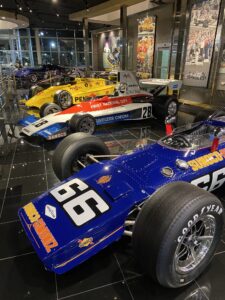


The Penske Racing Museum isn’t just a display of historic race cars — it’s a living collection of motorsports excellence. What sets this facility apart is its status as a “running museum,” where each historic race car is maintained in operating condition.
“The collection at the Penske Racing Museum showcases the history of one of the most successful teams in all of motorsports,” explains museum director Patrick J. Hozza. “What makes our museum special is that it’s a running museum — we maintain our race cars in operating condition, preserving these incredible machines as they were meant to be.”
Among the museum’s more than 100 vehicles are several legendary pieces, including the 1974 Porsche that Mark Donohue drove to victory in the first IROC at Riverside, and Danny Sullivan’s 1985 March IndyCar, famous for its “spin and win” victory at that year’s Indianapolis 500. Also on display is Team Penske’s first in-house designed and built Formula One car from 1974. A unique feature pairs each of their 20 Indianapolis 500-winning cars with the corresponding pace car from that year’s race.
Visitors can enhance their experience at the Turn 4 Cafe, located on the museum’s second floor, where Penske Racing’s winning trophies are displayed. The mezzanine offers views of the test track and Land Rover off-road course.
Penske Racing Museum
7191 E. Chauncey Lane, Phoenix // Monday–Saturday: 10 a.m.–4 p.m., Sunday: 12–5 p.m. // Free admission // penskeautomall.com
Rolling Thru Time Auto Museum
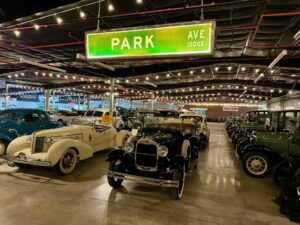


Family heritage drives the collection at Rolling Thru Time Auto Museum in Tucson, where approximately 225 vehicles tell stories spanning four generations and more than half a century of collecting.
“The family has been involved with Ace Hardware for 80 years,” says curator Joe Findysz, “and this store exhibits all the treasures that have been saved over the years. When people come into the museum, one of the most favorite exhibits is the old-time Ace Hardware store that sits in the middle of the museum.”
The museum’s attractions include a Model T assembly line, Caterpillar tractor collection, working machine shop, paint shop, mechanics shop, and a popular firetruck room. Among the most personal exhibits is Findysz’s first car — a 1924 Model T roadster he purchased at age 14.
Beyond its role as a museum, the facility serves as a community gathering space, hosting monthly car club meetings, field trips and special events ranging from ceremonies to baby showers. Each vehicle on display includes family photos, connecting visitors to the personal stories behind the machines.
Rolling Thru Time Auto Museum
4750 S. Park Ave., Tucson // Thursday–Saturday: 10 a.m.–5 p.m. (last admission 4 p.m.) // Adults: $12, seniors/first responders/students: $10, children 6–12: $6, under 5: free // rttmuseum.com
Tucson Auto Museum
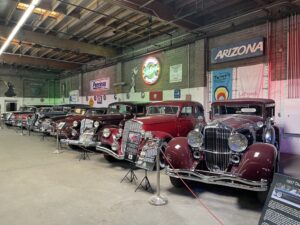


The Tucson Auto Museum is embarking on an exciting new chapter. In late January or early February 2025, the museum will hold the grand opening of its expanded facility in Sabino Canyon, featuring not just an enhanced automotive collection but also unique entertainment spaces.
Among the new attractions will be “The Batcave,” showcasing two Batmobiles and rare Batman memorabilia, and a state-of-the-art broadcast and podcast studio available for community rental. The museum’s collection of more than 75 classic cars and automobilia will be displayed in a significantly larger space designed to enhance the visitor experience.
The museum’s commitment to being a “living” collection continues in the new location, with all vehicles maintained in roadworthy condition. The collection includes a Model T, a 1929 Duesenberg Model J, a one-of-a-kind 1948 Kurtis-Omohundro Comet, a 1957 Dual-Ghia, and several vehicles with Hollywood histories, having appeared in shows like “Mannix,” “Charlie’s Angels” and “Batman.”
The new facility will also serve as an event venue, with an elegant event room available for group rentals, making it an ideal space for gatherings, celebrations and corporate functions.
Tucson Auto Museum
4825 N. Sabino Canyon Road, Tucson // Opening early 2025: Wednesday-Sunday: 10 a.m.–4 p.m. (last admission 3 p.m.) // Adults: $14, seniors/military/students: $12, children 12 and under: $8 // tucsonautomuseum.org

